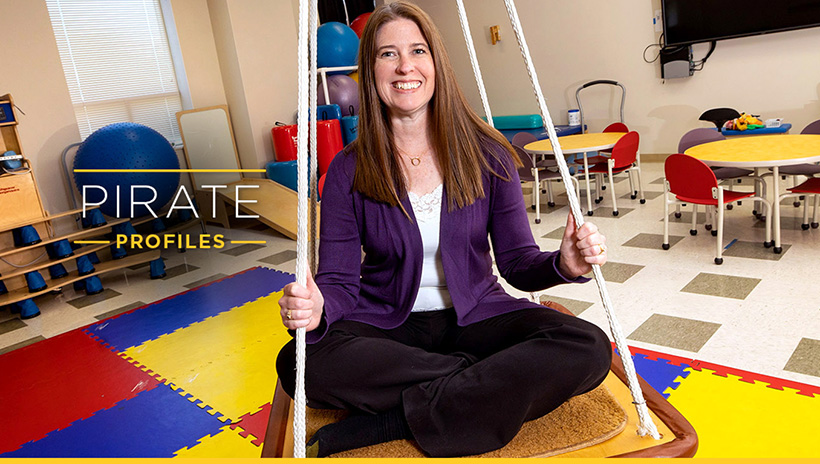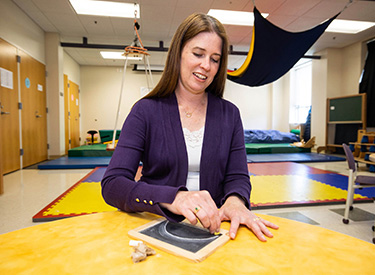Publisher's Note: This post appears here courtesy of
ECU News Services. The author of this post is
Ken Buday.
Dr. Denise Donica doesn't live in the negative. Positive outcomes fuel Donica, an associate professor and chair of the East Carolina University
Department of Occupational Therapy.
"The goal of occupational therapy is to help people to accomplish the tasks they want or need to do every day," she said.
"We are the problem-solvers who help people turn 'can't' into 'can and do.' Occupational therapy is a valuable service for individuals from birth to end of life through various practice settings — from medical settings such as hospitals and long-term care facilities to rehabilitation centers, to schools, to community-based sites, to industrial rehabilitation and beyond."
Donica grew up in Anderson, Indiana, a city she described as a factory town of about 55,000 people. She was involved in her church and enjoyed her days at Highland High School, where she was a majorette in the Marching Highlanders band.
Denise Donica, associate professor and chair of the Department of Occupational Therapy, demonstrates a task involved with the treatment of handwriting skills.
She decided to major in psychology at Indiana University but a conversation with a friend's father pointed her toward occupational therapy.
"Although it was also a field that focused on rehabilitation, it was founded in psychology, which was a big interest of mine," she said.
"I decided to shadow in the field and then made the choice to finish my double major while completing all of the prerequisites for occupational therapy school. I was sold."
After completing her undergraduate degrees, she began to practice in the field while completing her master's and doctorate in occupational therapy at the University of Indianapolis. Still, the thought of teaching never left her mind.
Denise Donica, associate professor and chair of the Department of Occupational Therapy, demonstrates a task involved with the treatment of handwriting skills.
"I have always been interested in teaching since I was little," she said.
"I remember playing school with my friends. I loved having worksheets to give to my 'students' and I loved grading their papers.
"As an occupational therapist, educating clients and their families is a critical component, so I continued my love for teaching through my chosen profession as an occupational therapist. I knew when I was in occupational therapy school that I wanted to teach one day. My goal was to practice for 10 years and then go into academia. I ended up practicing full time for eight years before moving into academia full time. I got close."
Donica embraced her "can and do" attitude in coming to ECU in 2008.
"My husband and I were both interested in moving to North Carolina even though neither of us had ever been here," she said.
"My trip to interview at ECU was my first time in the state. I fell in love with ECU and with Greenville. I loved how supportive the community was of ECU. I saw purple flags and signs everywhere. It seemed like a land of opportunity here, with both ECU and Vidant and the other health care facilities."
While at ECU, Donica has focused her research on the written communication skills of elementary-aged students, looking at handwriting and more recently keyboarding skills, and the handwriting curriculum developed by an occupational therapist called Handwriting Without Tears.
"Outcomes of my research have helped inform occupational therapists what strategies and techniques may be beneficial to use with students in treatment who are struggling with these skills," she said.
"Most of these studies have involved ECU occupational therapy students as well. One of my articles co-authored with a former thesis student on a handwriting assessment has been downloaded over 1,600 times in over 65 countries. It is very humbling to see my work being used by others."
Though the COVID-19 pandemic slowed progress, another project of Donica's focused on speech language pathology and offered a writing program to mostly elementary-aged students. Project members, including graduate students, developed a virtual program as part of the process.
"Through this program, the graduate students had the opportunity to work together with another discipline, develop rapport with a small group of children, plan group and individual interventions, and practice documentation skills and educating parents while learning firsthand what telehealth is like," Donica said.
"This program was a great experience."
Donica is proud of the work of the faculty, staff and students in the occupational therapy program, which was ranked in a tie for 36th out of 198 as the best accredited occupational therapy programs by U.S. News and World Report in 2020. She said the program has a five-year, 100% first-time pass rate of the national certification exam.
"The ECU occupational therapy program is a unique, blended focus of hands-on clinical practice skills and applied research skills. Typically, occupational therapy programs focus on one or the other," she said.
"Our curriculum is designed around ECU's mission to serve and weaves opportunities to serve the community through these efforts to teach clinical practice and research skills."
In her 13 years at ECU, Donica has received numerous awards and recognitions. She's been named to the Roster of Fellows by the American Occupational Therapy Association and also has received an AOTA Recognition of Achievement Award. She's received honors from the N.C. Occupational Therapy Association, and last year was inducted into the Phi Kappa Phi National Honor Society. She's been board certified in pediatrics since 2009.
At ECU, she has been a Servire Society inductee for volunteer service and was the recipient of a 2021 Centennial Award for service, the highest award given to ECU faculty and staff.
"It is very humbling to think the ways that I have served during my years at ECU have achieved this level of recognition," she said.
"I have always enjoyed serving others as a practicing clinician, as a faculty member and as a community member, and I seem to be drawn to those opportunities. I am honored to have been selected for this reward and to represent my department, the College of Allied Health Sciences and the Division of Health Sciences."
Favorite class to teach? My favorite classes to teach are OCCT 6100, Therapeutic Use of Human Occupation I, and OCCT 6150, Therapeutic Use of Human Occupation I Lab. These are the courses in the program that focus on occupational therapy intervention with children.


